Day 3 :
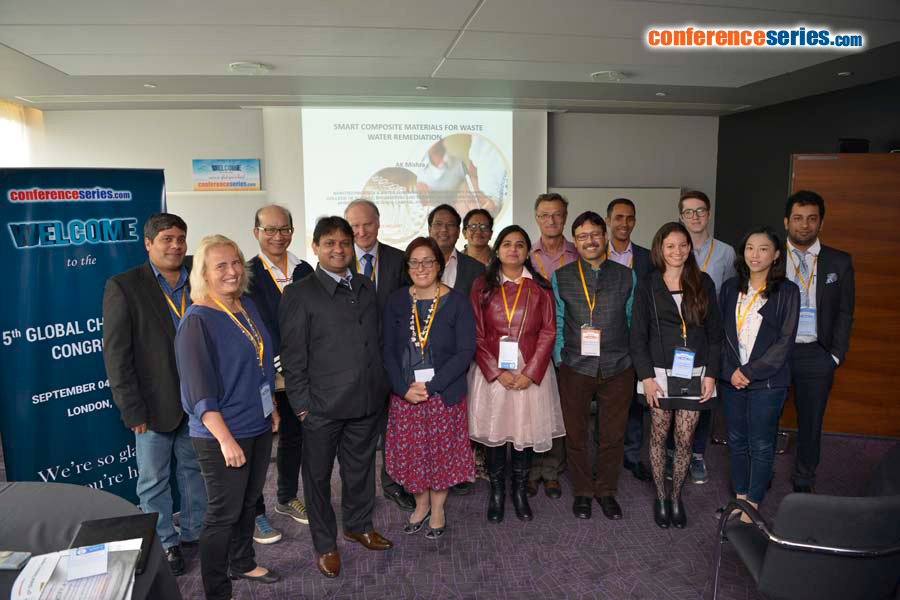
Biography:
Abstract:
- Organic Chemistry| Physical and Theoretical Chemistry |Nanoscience and Technology
Location: Endeavour

Chair
James Johnston
Victoria University of Wellington, New Zealand

Co-Chair
Luisa Di Paola
Università Campus Biomedico, Italy
Session Introduction
Junji Haruyama
Aoyama Gakuin University, Japan
Title: Electronic and magnetic behaviors of 2D atom-thin layers: Graphene, black phosphorus, hexagonal boron-nitride, and MoS2
Time : 11:10-11:35

Biography:
Abstract:
- Stevens, R. G. et al. (2014) Breast cancer and circadian disruption from electric lighting in the modern world. CA Cancer J. Clin. 64 (3): 207–218.
- S. M. Pauley (2004) Lighting for the human circadian clock: Recent research indicates that lighting has become a public health issue. Med. Hypotheses 63: 588–596.
- http://www.darksky.org
- Monico, L. et al. (2013) Degradation Process of Lead Chromate in Paintings by Vincent van Gogh Studied by Means of Spectromicroscopic Methods. 3. Synthesis, Characterization, and Detection of Different Crystal Forms of the Chrome Yellow Pigment. S. Anal. Chem. 85 (2): 851–859.
- Jou, J. H. et al. (2013) Candle Light-Style Organic Light-Emitting Diodes. Adv. Funct. Mater. 23: 2750–2757.
- Jou, J. H. et al. (2014) Enabling a blue-hazard free general lighting based on candle light-style OLED. Optics Express 23 (11): A577.
- Jou, J. H. et al., (2016) Wet-process feasible candlelight OLED,”
- J. Mater. Chem. C 4, 6070-6077.
Qinguo Zheng
Aston Univesity, UK
Title: Preparation of Modified Thionucleobases and Thionucleosides Using Room Temperature Ionic Liquids as Solvents
Time : 11:35-12:00

Biography:
Abstract:
References:
1. Chambert, S; Decout, J. L. Organic prepartions and procedures international, 2002, 34: 27-85
2. Estlin, E.J. Cancer treatment reviews, 2001, 27: 351-363
3. Hu X.; Ngwa C.; Zheng Q. Current Organic Synthesis, 2016, 9: 101-110
4. Kumar, V.; Parmar, V. S.; Malhotra, S. V. Tetrahedron Letters, 2007, 48: 809 - 812
5. Nielsen, O. H.; Vainer, B.; Rask-Madsen, J. Alimentary Pharmacology & therapeutics, 2001, 15:1699 - 1708
6. Prakash, T. P.; Bhat, B. Current topics in medicinal chemistry, 2007, 7: 641- 649
Philippe Lainé
Université Paris Diderot, France
Title: From single-electron processes to multielectron handling and storage at the molecular level: Designing super-electrophores for the next generation of prototypes of Tranducers for man-made photosynthesis?
Time : 12:00-12:25

Biography:
Abstract:
As part of our continuing research program devoted to artificial photosynthesis, which relies on multi-photon and multi-electron processes, we have recently revisited the physical chemistry, and especially the electrochemistry of pyridinium derivatives as multi-electron acceptors. Here we report on the design and rich electrochemistry of two classes of super-electrophores that share the uncommon feature of being able to undergo a two-electron reduction in a single step.The functioning of these superelectrophores relies on the intriguing phenomenon of potential inversion which can be implemented in different ways that actually correspond to two different electrochemical paradigms. On the one hand, there are polyaryl-substituted pyridiniums referred to as branched Expanded Pyridiniums (EPs), that are multifunctional platforms featuring good electrophoric properties and also effective chromophoric and luminophoric activities. On the other hand, there are specifically assembled multi-electrophoric compounds, referred to as Structronic Assemblies (SAs), characterized by their electrochemical hysteresis, that allow the storage of electrons in the form chemical bonds used as electron reservoirs. Special emphasis is herein placed on the rationalization of electrophoric properties and the mechanisms that explain the unusual electrochemical behavior of these two classes (EPs & SAs) of super-electrophores. These studies combine various experimental methods (crystallography, NMR, electrochemistry as well as in situ UV-vis. and IR spectroelectrochemistry) with theoretical modeling. Finally, the manner by which these types of super-electrophores (EPs & SAs) could be used within the framework of research devoted to man-made photosynthesis will be evoked.As part of our continuing research program devoted to artificial photosynthesis, which relies on multi-photon and multi-electron processes, we have recently revisited the physical chemistry, and especially the electrochemistry of pyridinium derivatives as multi-electron acceptors. Here we report on the design and rich electrochemistry of two classes of super-electrophores that share the uncommon feature of being able to undergo a two-electron reduction in a single step.The functioning of these superelectrophores relies on the intriguing phenomenon of potential inversion which can be implemented in different ways that actually correspond to two different electrochemical paradigms. On the one hand, there are polyaryl-substituted pyridiniums referred to as branched Expanded Pyridiniums (EPs), that are multifunctional platforms featuring good electrophoric properties and also effective chromophoric and luminophoric activities. On the other hand, there are specifically assembled multi-electrophoric compounds, referred to as Structronic Assemblies (SAs), characterized by their electrochemical hysteresis, that allow the storage of electrons in the form chemical bonds used as electron reservoirs. Special emphasis is herein placed on the rationalization of electrophoric properties and the mechanisms that explain the unusual electrochemical behavior of these two classes (EPs & SAs) of super-electrophores. These studies combine various experimental methods (crystallography, NMR, electrochemistry as well as in situ UV-vis. and IR spectroelectrochemistry) with theoretical modeling. Finally, the manner by which these types of super-electrophores (EPs & SAs) could be used within the framework of research devoted to man-made photosynthesis will be evoked.
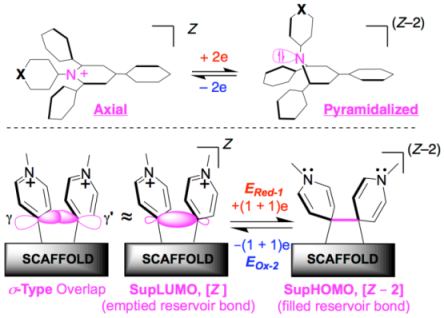
Recent Publications:
- Arrigo A, Santoro A, Puntoriero F, Lainé PP, Campagna S (2015) Photoinduced electron transfer in donor-bridge-acceptor assemblies: the case of Os(II)-bis(terpyridine)-(bi)pyridinium dyads. Coord. Chem. Rev., 304–305: 109–116.
- (a) Fortage J, Tuyèras F, Ochsenbein P, Puntoriero F, Nastasi F, Campagna S, Griveau S, Bedioui F, Ciofini I, Lainé, PP (2010) Expanded Pyridiniums: Bis-cyclization of Branched Pyridiniums into Their Fused Polycyclic and Positively Charged Derivatives – Assessing the Impact of Pericondensation on Structural, Electrochemical, Electronic and Photophysical Features. Chem. Eur. J., 16: 11047–11063. (b) Fortage J, Peltier C, Nastasi F, Puntoriero F, Tuyèras F, Griveau S, Bedioui F, Adamo C, Ciofini I, Campagna S, Lainé PP (2010) Designing Multifunctional Expanded Pyridiniums: Properties of Branched and Fused Head-to-Tail Bipyridiniums. J. Am. Chem. Soc., 132: 16700–16713.
- Fortage J, Peltier C, Perruchot C, Takemoto Y, Teki Y, Bedioui F, Marvaud V, Dupeyre G, Pospísil L, Adamo C, Hromadová M, Ciofini I, Lainé PP (2012) Single-Step versus Stepwise Two-electron Reduction of Polyarylpyridiniums: Insights from the Steric Switching of Redox Potential Compression. J. Am. Chem. Soc., 134: 2691–2705.
- Lachmanová Š, Dupeyre G, Tarábek J, Ochsenbein P, Perruchot C, Ciofini I, Hromadová M, Pospíšil L, Lainé PP (2015) Kinetics of Multielectron Transfers and Redox-Induced Structural Changes in N-Aryl-Expanded Pyridiniums: Establishing Their Unusual, Versatile Electrophoric Activity. J. Am. Chem. Soc., 137: 11349–11364.
Luisa Di Paola
Università Campus Biomedico, Italy
Title: The structural formula of proteins
Time : 12:25-12:50

Biography:
Abstract:
- L. Di Paola, M. De Ruvo, P. Paci, D. Santoni, A. Giuliani, Protein contact networks: an emerging paradigm in chemistry., Chem. Rev. 113 (2013) 1598–1613. doi:10.1021/cr3002356.
- L. Di Paola, A. Giuliani, Protein contact network topology: a natural language for allostery., Curr. Opin. Struct. Biol. 31 (2015) 43–48. doi:10.1016/j.sbi.2015.03.001.
- L. Di Paola, G. Mei, A. Di Venere, A. Giuliani, Exploring the stability of dimers through protein structure topology, Curr. Protein Pept. Sci. 17 (2016) 30–36. doi:10.2174/1389203716666150923104054.
- S. Cimini, L. Di Paola, A. Giuliani, A. Ridolfi, L. De Gara, GH32 family activity: a topological approach through protein contact networks, Plant Mol. Biol. (2016) 1–10.
- L. Di Paola, C.B.M. Platania, G. Oliva, R. Setola, F. Pascucci, A. Giuliani, Characterization of Protein–Protein Interfaces through a Protein Contact Network Approach, Front. Bioeng. Biotechnol. 3 (2015) 170. doi:10.3389/fbioe.2015.00170.
- G. Hu, L. Di Paola, Z. Liang, A. Giuliani, Comparative Study of Elastic Network Model and Protein Contact Network for Protein Complexes : The Hemoglobin Case, Biomed. Res. Int. 2017 (2017) Article ID 2483264. doi:10.1155/2017/2483264.
- Nanoscience and Technology|Organic Chemistry|Green chemistry And Renewable Resources
Location: Endeavour

Chair
Mahendra Nath Roy
University of North Bengal, India

Co-Chair
Ajay Kumar Mishra
University of South Africa, South Africa
Session Introduction
James Johnston
Victoria University of Wellington, New Zealand
Title: Aulana ®: Novel Nanogold Coloured Wool Textiles for Luxury Markets
Time : 13:50-14:15

Biography:
Abstract:

Fig 1: Aulana® scarf and rug

Fig 2: TEM and SEM images of gold nanoparticles on the cuticle surfaces and edges for pink and purple nanogold coloured wool
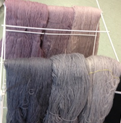
Fig 3: Aulana® yarn
Tuanli Yao
Shaanxi University of Science and Technology, China
Title: Palladium-Catalyzed Domino Heck/Aryne Carbopalladation/C-H Functionalization: Synthesis of Heterocycle-Fused 9,10-Dihydrophenanthrenes
Time : 14:15-14:40

Biography:
Abstract:
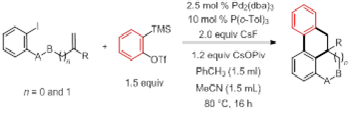
- Yao, T.; Liu, D.; Zhang, C. “Palladium-catalyzed domino Heck/intermol ecular cross-coupling: efficient synthesis of 4-alkylated isoquinoline derivatives” Chem. Commun. 2017, 53, 2386.
- Yao, T.; Dan, H. “Palladium-Catalyzed Domino Heck/Aryne Carbopalladation/C-H Functionalization:Synthesis of Heterocycle-Fused 9,10-Dihydrophenanthrenes”, Org. Lett. 2017, 19, 842
- Yao, T.; Zhang, H.; Zhao, Y. “Synthesis of 9,10-Phenanthrenes via Palladium-Catalyzed Aryne Annulation by o-Halostyrenes and Formal Synthesis of (±)-Tylophorine”, Org. Lett. 2016, 18, 2532.
- Yao, T. “Facile N-arylation of amidines and N,N-disubstituted amidines”, Tetrahedron Lett. 2015, 56, 4623.
- Schroeder, C. E.; Yao, T.; Sotsky, J. B.; Smith, R. A.; Roy, S.; Chu, Y. K.; Guo, H.; Tower, N. A.; Noah, J. W.; McKellip, S.; Sosa, M.; Rasmussen, L.; Smith, L. H.; White, E. L.; AubeÌ, J.; Jonsson, C. B.; Chung, D.-H.; Golden, J. E. “Development of (E)-2-((1,4-dimethylpi-perazin-2-ylidene)amino)-5-nitro-N-phenylbenzamide, ML336: novel2-amidinophenylbenzamides as potent inhibitors of Venezuelan equine encephalitis virus”. J. Med. Chem. 2014, 57, 8608..
Bhaskar Chakraborty
Sikkim Government College, India
Title: Synthesis of Some Novel Class of Isoxazolidine & Isoxazoline Derivatives using Some Novel Class of Nitrones via 1,3-Dipolar Cycloaddition Reaction using Greener Methodologies
Time : 14:40-15:05

Biography:
Abstract:
- Yao, T.; Liu, D.; Zhang, C. “Palladium-catalyzed domino Heck/intermol ecular cross-coupling: efficient synthesis of 4-alkylated isoquinoline derivatives” Chem. Commun. 2017, 53, 2386.
- Yao, T.; Dan, H. “Palladium-Catalyzed Domino Heck/Aryne Carbopalladation/C-H Functionalization:Synthesis of Heterocycle-Fused 9,10-Dihydrophenanthrenes”, Org. Lett. 2017, 19, 842
- Yao, T.; Zhang, H.; Zhao, Y. “Synthesis of 9,10-Phenanthrenes via Palladium-Catalyzed Aryne Annulation by o-Halostyrenes and Formal Synthesis of (±)-Tylophorine”, Org. Lett. 2016, 18, 2532.
- Yao, T. “Facile N-arylation of amidines and N,N-disubstituted amidines”, Tetrahedron Lett. 2015, 56, 4623.
- Schroeder, C. E.; Yao, T.; Sotsky, J. B.; Smith, R. A.; Roy, S.; Chu, Y. K.; Guo, H.; Tower, N. A.; Noah, J. W.; McKellip, S.; Sosa, M.; Rasmussen, L.; Smith, L. H.; White, E. L.; AubeÌ, J.; Jonsson, C. B.; Chung, D.-H.; Golden, J. E. “Development of (E)-2-((1,4-dimethylpi-perazin-2-ylidene)amino)-5-nitro-N-phenylbenzamide, ML336: novel2-amidinophenylbenzamides as potent inhibitors of Venezuelan equine encephalitis virus”. J. Med. Chem. 2014, 57, 8608..
Zaw Ye Maw Oo
D. Mendeleev University of Chemical Technology, Russia
Title: Regulation Of Open Porosity And Strength In Ceramics Based On Electro Corundum And Porcelain Biinder
Time : 15:05-15:30

Biography:
Abstract:
Fanna Inna Abdulrahman
University of Maiduguri, Nigeria
Title: Photochemistry,Isolations and Some Pharmacological Studies of ethanol leaf extract of Piliostigma thonningii
Time : 15:45-16:10

Biography:
Abstract:
- Abdulrahman F.I, Tijjani M.A. and Osuji U.O.(2012). Proximate Content and Chemical Composition of Ocimum Viridis leaf and Ocimum Gratissum Leaf. International Research Journal of Pharmacy. Vol. 3(4). Pp 153-156.
- Bala, U. Shamaki, El-Yuguda Abdul-Dahiru, F.I. Abdulrahman, Adam, O. Ogbe and Umar K. Sandabe(2013) In vitro Inhibition of Neuraminidase Activity of Influenza Virus (H5N2) by Methanolic Soluble Fraction of Ganodermalucidum Extract. Int.J. Mordern Bio. And Med, 4(3) 147-154
- Sodipo, O. A, F.I. Abdulrahman, U.K. Sandabe and B. Wampana (2013) EndocrineFunction in Acute Triton-induced Hyperlipidaemic Rats after being administeredAqueous Fruit Extract of Soloanummacrocarpum, α-Solanidine and StandardHypolipidaemic Agents. J. Plant studies 2(1): 110-119
- Shamaki, B. U, Ogbe, A.O, Abdulrahman, F.I and Sandabe, U. K. (2014) Effect of Prolonged Administration of Methanolic Extract of GanodermaLucidum on BloodGlucose levels in Normal Albino Rats. Int. J. Pharm. Research and Analysis,4(2):122-124
- Shamaki, B. U, Ogbe, A.O, Abdulrahman, F.I and Sandabe, U. K. (2014) Haematological Parameters in normal Albino Rats following Oral Administration of Methanolic Extract of Wild GanodermaLucidum SP. Int. J. Pharm Scree. Methods. 4(2): 94-99
- Industrial and Engineering Chemistry|Organic Chemistry|Nanoscience and Technology|Physical and Theoretical Chemistry|Medicinal Chemistry|Environmental Chemistry
Location: Endeavour

Chair
Luisa Di Paola
Università Campus Biomedico, Italy

Co-Chair
Bhaskar Chakraborty
Sikkim Government College, India
Session Introduction
Satya Dubey
Cranfield University, UK
Title: Catalytic Synthesis of Environmental friendly Polymer Poly Lactic Acid via Continuous Reactive Extrusion: Recent Trends
Time : 11:45-12:10

Biography:
Abstract:
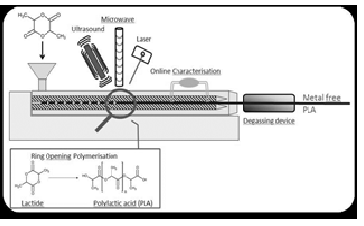
- Satya P Dubey1, Hrushikesh A Abhyankar, Veronica Marchante, James L Brighton, Kim Blackburn, Clive Temple, Björn Bergmann, Giang Trinh, Chantal David, “Modelling and Validation of Synthesis of Poly Lactic Acid using Alternative Energy Source through Continuous Reactive Extrusion Process” Polymers (Vol:8, 164; doi:10.3390/polym8040164 2016
- Satya P Dubey1, Hrushikesh A Abhyankar, Veronica Marchante, James L Brighton, Björn Bergmann, Giang Trinh, Chantal David, “Microwave Energy assisted Synthesis of Poly Lactic Acid through Continuous Reactive Extruder: Reaction kinetics modelling approach” (RSC Advances, 2017, 7, 18529 – 18538. DOI: 10.1039/c6ra26514f.)
- Satya P Dubey1, Hrushikesh A Abhyankar, Veronica Marchante, James L Brighton, Kim Blackburn, “Review on catalytic progress on poly lactic acid formation through ring opening polymerization” (International Research Journal of Pure and Applied Chemistry)”. 2016 – Vol: 12, issue 3, IRJPAC/26179
- Satya P Dubey1, Hrushikesh A Abhyankar, Veronica Marchante, James L Brighton, Björn Bergmann, “Mathematical Modeling for Continuous Reactive Extrusion of Poly Lactic Acid formation by Ring Opening Polymerization Considering Metal/Organic Catalyst and Alternative Energies” International Journal of Chemical, Nuclear, Materials and Metallurgical Engineering-( Vol:9, No:2, 2015)
- A. Ojha, N. Vyas, and Satya P Dubey, “Gas phase structural stability of neutral and zwitterionic forms of alanine in presence of (H2O)n=1–7 clusters: A density functional theory study,” Comput. Theor. Chem., vol. 1002, pp. 16–23, Dec. 2012.
Mahendra Nath Roy
University of North Bengal, India
Title: Encapsulation of β-Cylodextrin with Vitamine-B and Vitamin-C molecules
Time : 12:10-12:35

Biography:
Abstract:
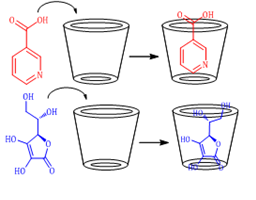
Figure 1. Encapsulation of nicotinic acid and ascorbic acid with β-CD
Recent Publications:
- M. N. Roy*, D. Ekka, J Phys. Chem. B, 2012, 116, 11687.
- M. N. Roy*, A. Bhattacharjee, Phys. Chem. Chem. Phys. 2010, 12, 14534.
- M. N. Roy*, A. Roy, S. Saha, Carbohydrate Polymers, 2016, 151, 458-466.
- M. N. Roy*, S. Saha, T. Ray, S. Basak, New. J. Chem., 2016, 40, 651.
- M. N. Roy*, S. Saha, M. Kundu, S. Barman, Chemical Physics Letters. 2016, 655, 43.
- M. N. Roy*, S. Saha, S.Barman and D. Ekka. RSC Adv., 2016, 6, 8881.
- M. N. Roy*, D. Ekka, Amino Acids, 2013, 45, 755.
Ewelina Tomecka
Warsaw University of Technology, Poland
Title: Nanofiber mats fabricated by solution blow spinning as potential substrates for cardiac cell culture
Time : 12:35-13:00

Biography:
Abstract:
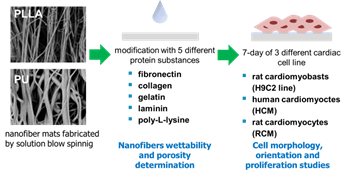
Recent Publications:
- Ricotti L, Polini A, Genchi G G, Ciofani G, Iandolo D, Vazão H, Mattoli V, Ferreira L, Menciassi A, Pisignano D (2012) Proliferation and skeletal myotube formation capability of C2C12 and H9c2 cells on isotropic and anisotropic electrospun nanofibrous PHB scaffolds. Biomedical Materials, 7: 035010.
- Orlova Y, Magome N, Liu L, Chen Y, Agladze K, (2011) Electrospun nanofibers as a tool for architecture control in engineered cardiac tissue. Biomaterials, 32: 5615–5624.
- Ashammakhi N, Ndreu A, Yang Y, Ylikuppila H, Nikkola L (2012) Nanofiber-based scaffoldsnfor tissue engineering. European Journal of Plastic Surgery, 35: 135 – 149.
- WojasiÅ„ski M, Pilarek M, Ciach T (2014) Comparative studies of electrospinning and solution blow spinning processes for the production of nanofibrous poly(L-lactic acid) materials for biomedical engineering. Pol. J. Chem. Technol. 16: 43–50.
- Tomecka E, Wojasinski M, Jastrzebska E, Chudy M, Ciach T, Brzozka Z (2017) Poly(L-lactic acid) and polyurethane nanofibers fabricated by solution blow spinning as potential substrates for cardiac cell culture. Materials Science and Engineering C 75: 305–316.
Mirosław Kwiatkowski
AGH University of Science and Technology, Poland
Title: Application of the LBET method to an analysis of single and multiple carbon dioxide and methane adsorption isotherms
Time : 14:00-14:25

Biography:
Abstract:
Mustapha abba Tijjani
University of Maiduguri, Nigeria
Title: Isolation and Structural Elucidation of 20 hydroxyecdystone from Vitex doniana Sweet Stem bark (Black plum)
Time : 14:25-14:50

Biography:
Abstract:
Recent Publications:
- Mustapha A Tijjani, Garba T Mohammed Yagana T Alkali, Thiza B Adamu1, Fanna I Abdurahaman (2017). Phytochemical analysis, analgesic and antipyretic properties of ethanolic leaf extract of Vernonia amygdaline Del. Journal of Herbmed Pharmacology
- Shettima A Y, Tijani MA, Mekaron K., Henry O. Modu B. and Tijani Y. (2016).Effect of methanolic root extract of Guiera senegalensis on some Biochemical and Hematological Parameters in Albino Rats. The Pharmaceutical and chemical Journal. 3(2): 71-78
- M.A. Tijjani; S.W. Buba , G.M. Tom, F.I. Abdulrahman, A.I. Mohammed B.A Gana.(2014). Preliminary Phytochemical screening and mineral Content of Nigella Sativa Linn. (Black Caraway) Seed. International Journal of Medicinal Chemistry & Analysis. Vol.4./issue 4. 226-2210.
- Shettima A.Y. Karumi Y, Sodipo OA, Usman H and Tijjani MA. (2013).Gas Chromatography–Mass Spectrometry (GC-MS) Analysis of Bioactive Components of Ethyl acetate Root Extract of Guierasenegalensis J.F. Gmel. Journal of Applied Pharmaceutical Science Vol. 3 (03), pp. 146-150.
- Mustapha A. Tijjani, Fanna I. Abdulrahman, Irfan Z. Khan and Umar K. Sandabe (2012). The Effects of Ethanolic Extracts of Vitex Doniana Stem bark on Central and Peripheral Nervous System of on laboratory Animals. Journal of Applied Pharmaceutical Science. Vol. 02(03).Pp 74-79.
Phanice Wangila
University of Kabianga,Kenya
Title: Concentration of Pb and Cd in Soil and Reed Plant of Busia and Lugari Regions of Western Kenya
Time : 14:50-15:15

Biography:
Abstract:
- Networking
Session Introduction
Networking
@RBG
Title: Join in Networking to Share your Academic and Business Ideas
Biography:
Abstract:
You can Join in Netwoking to Share your research and Business ideas by Networking and Lunch Session. also Chemistry Conferences welcome chemical professionals, researchers, professors, scientific communities, delegates, students, business professionals and executives from all over the world to attend next annual conference “9th Global Chemistry Conference” which is to be held during July 23-24, 2018 at Lisbon, Portugal which includes prompt Keynote presentations, Oral talks, Poster presentations and Exhibitions.

